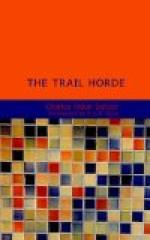The men had finished, and the long shadows of the dusk were stealing out over the desert, when Lawler—sitting on the chuck-box—heard Blackburn exclaim sharply:
“Hell’s fire! Here they come!”
Blackburn had sprung to his feet, his eyes blazing with the pent-up wrath that had been in them for many days. He was tense, his muscles straining; and his fingers were moving restlessly near the butt of the huge pistol that swung at his hip. The fingers were closing and unclosing, betraying the man’s passion.
Lawler got to his feet. Following the direction of Blackburn’s flaming eyes, he saw, perhaps a mile away, a large body of horsemen. They were descending the long slope over which the herd had been driven.
Lawler counted them—thirty-nine. But the menace was no longer invisible; it was now a material thing which could be met on such terms as might be, with the law of chance to govern the outcome.
Lawler did not doubt that the on-coming riders were hostile. He had felt that when he first had been made aware of their presence behind the herd. He saw, too, that the men of his outfit felt as he did; for they were all on their feet, their faces grim, their eyes glowing with the rage that had gripped them over the presence of the unseen menace; their muscles were tensed and their lips were in the sullen pout which presages the imminence of action.
Shorty, the tawny giant, was a terrible figure. He seemed to be outwardly cool, and there was not a sign of passion in his manner. His hands swung limply at his sides, not a muscle in his body seeming to move. Unlike the other men, he was calm, seemingly unperturbed. So striking was the contrast between him and the other men that Lawler looked twice at him. And the second time he saw Shorty’s eyes—they were gleaming pools of passion, cold, repressed.
“Easy, boys!” Lawler called to the men. “Don’t let them suspect you know they’ve been trailing us. They’ve got us two to one, almost—if they mean trouble we’ll have to work easy!”
He saw the men relax; and several of them resumed their former positions at the fire.
The strange riders were coming steadily onward; they were not more than a hundred yards distant when Blackburn exclaimed, hoarsely:
“Lawler; it’s Blondy Antrim an’ his gang! Damn his hide! We’re in for it!”
For the first time since Garvin had told him of the presence of the men on the trail behind the herd, Lawler’s face betrayed passion—the glow in his eyes rivaled that in the giant’s.
During the past year or so word had reached him—rumor unfounded, but insistent—that more than once Singleton and Blondy Antrim, the outlaw, had been seen together. He had placed no credence in the rumors, ascribing them to the imaginations of mischievous brains, prejudiced against Singleton because of his bluff, dominant manner. He first had suspected there might be truth in them when Joe Hamlin had told him that he had rustled cattle for Singleton. He now believed that Singleton had disposed of the stolen cattle through Antrim and the conviction that Singleton was behind the action of the outlaw in trailing the herd through the country seized him.




